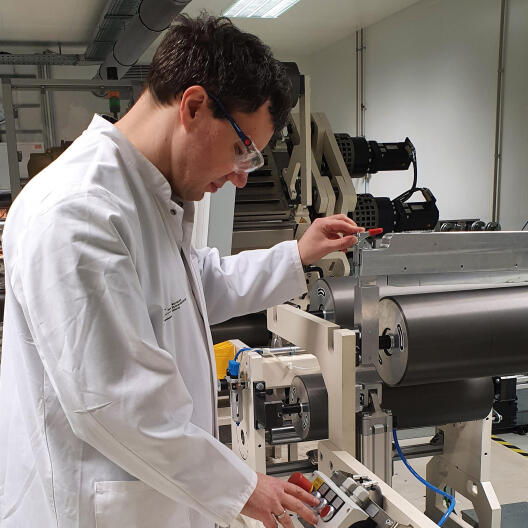âTime Has Come for a New Battery Technology on the Marketâ
Whether lithium metal, solid-state, lithium-sulphur or sodium batteries: The field of potential so-called "next-generation" battery systems is large. On the occasion of Battery Day on February 18, Dr Peter Bieker, MEET Battery Research Center at the University of Münster and Helmholtz Institute Münster, a branch of Forschungszentrum Jülich, provides an overview of promising battery systems of the future and explains why "higher, faster, further" is not the only road to take.
What will it look like, the much-praised "battery of the future"?
Peter Bieker: Most likely, there will not be one battery technology of the future. We expect the market to become more differentiated. Currently, the lithium-ion battery dominates because it is a true all-rounder. It will continue to be the dominant battery type for the next 10-15 years, but we are convinced that other systems will come along – depending on the application. For example, an aircraft needs a lightweight battery, while batteries in everyday devices such as smartphones or watches tend to be optimised for small space requirements. But when it comes to batteries, it does not always have to be "higher, faster, further". Parameters such as "more environmentally friendly, more available, less expensive" are increasingly coming into focus. We therefore need to rethink and make our demands on batteries more differentiated.

Which battery systems are the most promising candidates as next-generation batteries?
Peter Bieker: Lithium-metal batteries with a solid electrolyte are considered very promising. They have a very high energy density, can probably more than keep up with lithium-ion batteries in terms of safety and are the beacon of hope for electromobility and aviation. Research is currently underway to further improve the stability of this technology. Many expect to see lithium-metal batteries on the market before the end of this decade.
Another technology could also be added in this decade, such as a lithium-free battery that does also not use environmentally harmful and expensive metals like nickel or cobalt. Several technologies are investigated, for example, for home applications such as alarm systems, thermostats or even loudspeakers.
A cheaper and also resource-saving alternative to lithium-ion batteries could be sodium-ion batteries. Although these battery cells will probably have a lower energy density, they may have advantages in terms of rapid charging. In Japan, for example, the first intermediate storage units for power plants are already being operated with this type of battery.
The range is wide. Are there further options?
Peter Bieker: Another option is dual-ion technology. Here, instead of just one type of ion – the lithium-ion – the electrolyte anions are also involved in energy storage. The electrolyte thus acts as an active material, which offers further optimisation approaches. Emergency power generators, for example, or other stationary applications are conceivable as an area of application.
Intensive research is also being conducted into organic polymer batteries. These have very high charge and discharge rates and would therefore be suitable for applications such as brake boosters in cars, buses or trains. However, they are more power storage devices than energy storage devices.
Why are these technologies not yet available?
Peter Bieker: With each of the alternative technologies, there are still aspects that require further research – whether in terms of energy density, safety or cycle stability. It is particularly important to consider the manufacturing process for new battery technologies.
What role does sustainability play in this context?
Peter Bieker: Here in Europe a huge role! Factors such as the production of materials from renewable raw materials, environmentally friendly production processes or second use and recycling of used batteries must already be considered in the development of new battery types. There is enormous ecological and economic potential in the circular economy of batteries. It is for a long time also focus of our research.

